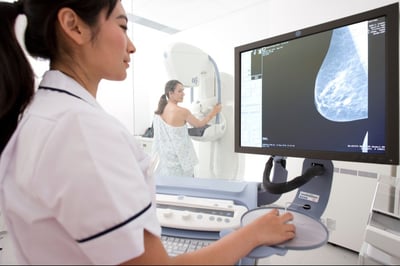FORCE's eXamining the Relevance of Articles for You (XRAY) program looks behind the headlines of cancer news to help you understand what the research means for you.
XRAY is a reliable source of hereditary cancer research-related news and information.
Learn more about the XRAY program
Categories Prevention, Screening
Relevance: High


Quality of Writing: High


Article : Signs of endometrial cancer: Six survivor stories
Relevance: High


Quality of Writing: High


Most relevant for: Women who want to learn more about the signs of or are at risk for endometrial cancer.
This article shares the experiences of six women diagnosed with endometrial cancer. It highlights the most common signs of endometrial cancer. (Posted 11/16/23)
Este artículo está disponible en español.
Read More
Article : Artificial intelligence (AI) may find breast cancer on mammograms sooner
Most relevant for: People interested in the use of artificial intelligence in medicine
Artificial intelligence (AI) tools may help doctors read mammograms. This assistance may lead to earlier diagnoses of breast cancer. (Posted 9/29/23)
Este artículo está disponible en español.
Read More
Topic : Reducing ovarian cancer risk without removing the ovaries
Most relevant for: People who are not at high risk of ovarian cancer who are having pelvic surgery
A leading ovarian cancer organization has recommended that all women who have pelvic surgery should also consider removing their fallopian tubes to reduce their risk of ovarian cancer. (Posted 7/18/23)
Read More
Relevance: Medium-High


Guideline : What is breast density and why does it matter?
Relevance: Medium-High


Most relevant for: People who have mammograms
New FDA guidelines for mammograms will go into effect by September 2024. Current FDA guidance requires hospitals and breast centers to give people information about their breast density with their mammogram results. By September 2024, mammogram providers will need to relay to patients who have dense breast that they should discuss the need for additional imaging. This article provides an overview of what breast density means and why it matters. (Posted 6/8/23)
Este artículo está disponible en español.
Read More
Article : A food lover’s decision to remove her stomach highlights difficult decisions around cancer risk
Most relevant for: People with a CDH1 mutation or a family history of stomach cancer
National Public Radio reporter Sáša Woodruff shares her story of learning about her CDH1 mutation and making a decision about risk-reducing surgery. Mutations in the CDH1 gene significantly increase a person’s risk of stomach and breast cancers. Woodruff’s personal essay describes the psychological challenge of making decisions about risk-reducing surgeries and draws attention to a lesser-known mutation linked to hereditary cancer. (Posted 5/17/23)
Este artículo está disponible en español.
Read More
Relevance: Medium


Strength of Science: Medium-High


Research Timeline: Human Research


Study : Early removal of ovaries may be linked to small increase in risk of Parkinson’s disease in later life
Relevance: Medium


Strength of Science: Medium-High


Research Timeline: Human Research


Most relevant for: Women considering risk-reducing removal of both ovaries
The lifetime risk of developing Parkinson’s disease is low. However, having surgery to remove both ovaries before natural menopause can slightly increase the risk of Parkinson's disease later in life. Researchers studied over 20 years of medical records, which confirmed this small increase in risk, particularly for women who have their ovaries removed before age 43. (Posted 5/3/23)
Este artículo está disponible en español.
Read More
Relevance: Medium-High


Strength of Science: Medium


Research Timeline: Human Research


Study : Hormonal birth control may reduce ovarian cancer risk in people with BRCA mutations
Relevance: Medium-High


Strength of Science: Medium


Research Timeline: Human Research


Most relevant for: Women with BRCA1 or BRCA2 mutations who are interested in reducing their ovarian cancer risk
Hormonal birth control pill is linked to reduced ovarian cancer among people with an inherited BRCA mutation. Longer-acting forms of birth control given by implant, injection or as an intrauterine device may be associated with lower ovarian cancer risk for people with an inherited BRCA mutation. (Posted 4/28/23)
Este artículo está disponible en español.
Read More
Relevance: Medium


Strength of Science: Medium


Research Timeline: Animal Studies


Study : Weight may affect breast cancer risk in women with an inherited BRCA mutation
Relevance: Medium


Strength of Science: Medium


Research Timeline: Animal Studies


Most relevant for: People with an inherited mutation in BRCA1 or BRCA2 concerned about their breast cancer risk
A study that looked at normal breast cells from women with an inherited BRCA mutation found more DNA damage among women who were overweight (based on a measurement known as body mass index) than those who were not overweight. The results suggest that maintaining a lower weight may reduce breast cancer among this high-risk population. (Posted 3/30/23)
Este artículo está disponible en español.
Read More
Relevance: Medium


Strength of Science: Medium-High


Research Timeline: Post Approval


Study : Frequent aspirin use may reduce the risk of ovarian cancer
Relevance: Medium


Strength of Science: Medium-High


Research Timeline: Post Approval


Most relevant for: Healthy people at high-risk of ovarian cancer.
Aspirin may help lower the risk of ovarian cancer in people who have a high risk of the disease, according to a new analysis of 17 studies. While other preventive strategies have been found to more effectively lower the likelihood of developing ovarian cancer in high-risk women, taking aspirin daily or almost daily may reduce a person’s risk of developing ovarian cancer by 13 percent. The benefit was greater among people with additional risk factors for the disease. (Posted 2/22/23)
Este artículo está disponible en español.
Read More
Update : Breast cancer vaccine trial begins enrolling people with BRCA1 and PALB2 mutations
Most relevant for: People with a BRCA1 or PALB2 mutation undergoing prophylactic bilateral mastectomy
A new vaccine was first tested on people diagnosed with triple-negative breast cancer. The vaccine is now being tested to prevent breast cancer among people with an inherited mutation in BRCA1 or PALB2 who are at high risk and who are planning to have a risk-reducing mastectomy. (Posted 1/9/23) Este artículo está disponible en español.
Read More